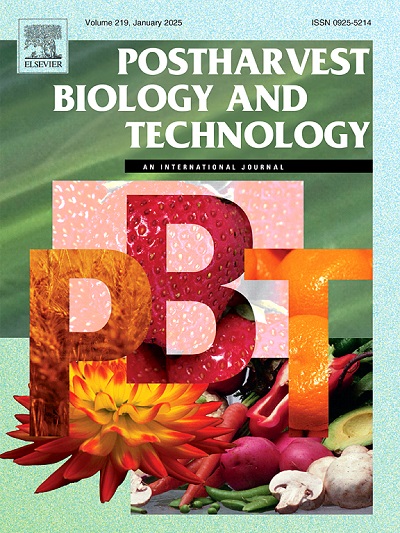硫酸软骨素延缓荔枝果皮褐变是提高荔枝果实收获后抗氧化活性和膜完整性的原因
IF 6.8
1区 农林科学
Q1 AGRONOMY
引用次数: 0
摘要
荔枝果皮易发生快速褐变,影响其销路。本文研究了天然糖胺聚糖多糖硫酸软骨素对荔枝果皮褐变的抑制作用。结果显示硫酸软骨素抑制褐变进程和色度值显示的颜色变化。它显著降低了超氧阴离子(O2.-)自由基和过氧化氢(H2O2)的生成速率,延缓了丙二醛(MDA)含量的增加和相对电解质泄漏率,从而保持了膜的完整性。硫酸软骨素还能抑制总酚、类黄酮、花青素和抗氧化活性的下降,并保持对2,2-二苯基-1-苦味酰肼(DPPH)的清除能力和还原能力。它提高了抗氧化防御关键的超氧化物歧化酶(SOD)、过氧化氢酶(CAT)和苯丙氨酸解氨酶(PAL)的活性,同时抑制了多酚氧化酶(PPO)、过氧化物酶(POD)和漆酶(LAC)等氧化酶的活性。硫酸软骨素还能调节苯酚合成相关关键基因LcPAL1、LcANS1、LcANS2,以及苯酚合成相关氧化酶的lcpo1 /2、lcpo1 /12、LcLAC2/14的表达水平。研究结果表明,硫酸软骨素能有效调节活性氧状态,增强抗氧化活性,具有作为天然防腐剂延长荔枝果实贮藏期的潜力。本文章由计算机程序翻译,如有差异,请以英文原文为准。
Delay of pericarp browning by chondroitin sulfate attributes of enhancing antioxidant activity and membrane integrity in litchi fruit after harvest
Litchi fruit is prone to rapid pericarp browning, which impacts its marketability. Herein, the application of a natural glycosaminoglycan polysaccharide, chondroitin sulfate to inhibit the development of pericarp browning in litchi fruit was investigated. The results revealed that chondroitin sulfate suppressed browning progression and changes in color indicated by chromaticity values. It markedly reduced the production rates of superoxide anion (O2.-) radical and hydrogen peroxide (H2O2), retarded the increase in malondialdehyde (MDA) content and relative electrolyte leakage rate, thereby preserving membrane integrity. Chondroitin sulfate also prevented the decline in total phenols, flavonoids, anthocyanins, and antioxidant activity, as evidenced by maintained scavenging capacity of 2,2-Diphenyl-1-picrylhydrazyl (DPPH) and reducing power. It enhanced the enzymatic activities of superoxide dismutase (SOD), catalase (CAT), and phenylalanine ammonia lyase (PAL), which are critical for antioxidant defense, while suppressing the activities of oxidative enzymes such as polyphenol oxidase (PPO), peroxidase (POD), and laccase (LAC). Furthermore, chondroitin sulfate modulated the expression levels of key genes such as LcPAL1, LcANS1, LcANS2 associated with phenol synthesis, and LcPPO1/2, LcPOD1/12, LcLAC2/14 for the oxidative enzymes involved in phenol synthesis. These findings demonstrate that chondroitin sulfate effectively regulates reactive oxygen species (ROS) status and enhances antioxidant activity, underscoring its potential as a natural preservative for extending shelf life of litchi fruit during storage.
求助全文
通过发布文献求助,成功后即可免费获取论文全文。
去求助
来源期刊

Postharvest Biology and Technology
农林科学-农艺学
CiteScore
12.00
自引率
11.40%
发文量
309
审稿时长
38 days
期刊介绍:
The journal is devoted exclusively to the publication of original papers, review articles and frontiers articles on biological and technological postharvest research. This includes the areas of postharvest storage, treatments and underpinning mechanisms, quality evaluation, packaging, handling and distribution of fresh horticultural crops including fruit, vegetables, flowers and nuts, but excluding grains, seeds and forages.
Papers reporting novel insights from fundamental and interdisciplinary research will be particularly encouraged. These disciplines include systems biology, bioinformatics, entomology, plant physiology, plant pathology, (bio)chemistry, engineering, modelling, and technologies for nondestructive testing.
Manuscripts on fresh food crops that will be further processed after postharvest storage, or on food processes beyond refrigeration, packaging and minimal processing will not be considered.
 求助内容:
求助内容: 应助结果提醒方式:
应助结果提醒方式:


